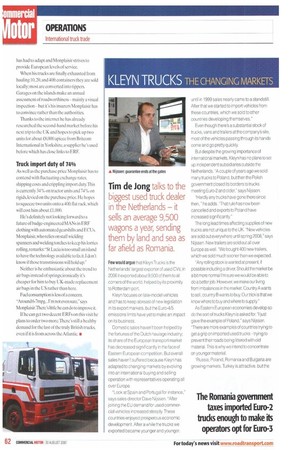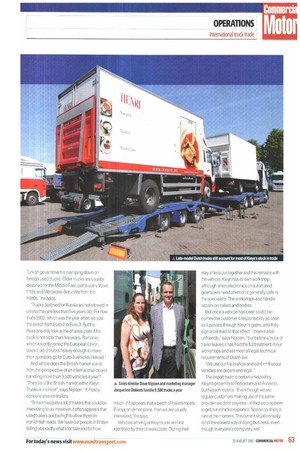KLEYN TRUCKS THE CHANGING MARKETS Tim de Jong talks to
Page 62

Page 63

If you've noticed an error in this article please click here to report it so we can fix it.
the biggest used truck dealer in the Netherlands — it sells an average 9,500 wagons a year, sending them by land and sea as far afield as Romania.
Few wauld argue that Kleyn Trucks is the Netherlands' largest exporter of used CVs; in 2006 it exported about 9,500 of them to all corners of the world, helped by its proximity to Rotterdam port.
Kleyn focuses on late-model vehicles and has to keep abreast of new legislation in its export markets, but the Euro-4/5 emissions limits have yet to make an impact on its business.
Domestic sales haven't been helped by the fortunes of the Dutch haulage industry; its share of the European transport market has decreased significantly in the face of Eastern European competition. But overall sales haven't suffered because Kleyn has adapted to changing markets by evolving into an international buying and selling operation with representatives operating all over Europe.
"Look at Spain and Portugal for instance," says sales director Dave Nijssen. "After joining the EU demand for used commercial vehicles increased steeply. These countries enjoyed prosperous economic development. After a while the trucks we exported became younger and younger, until in 1999 sales nearly came to a standstill. After that we started to import vehicles from these countries, which we sold to other countries developing themselves."
Even though there's a substantial stock of trucks, vans and trailers at the company's site, roost of the vehicles passing through its hands come and go pretty quickly.
But despite the growing importance of international markets, Kleyn has no plans to set up independent subsidiaries outside the Netherlands. "A couple of years ago we sold many trucks to Poland, but then the Polish government closed its borders to trucks meeting Euro-2 and older,' says Nijssen.
"Hardly any trucks have gone there since then, "he adds. "That rule has now been cancelled and exports to Poland have increased significantly."
The long lead times affecting supplies of new trucks are not unique to the UK. "New vehicles are sold out everywhere until spring 2008," says Nijssen. New trailers are sold out all over Europe as well. "We bought 400 new trailers, which we sold much sooner than we expected.
"Any rolling stock is wanted at present, if possible including a driver. Should the market be a bit more normal I'm sure we would be able to do a better job. However, we make our living from imbalances in the market. Country Awants to sell, country B wants to buy Our trick is thatwe knowwhere to buy and whereto supply" As Eastern European economies develop so do the sort of trucks Kleyn is asked for. "I just gave the example of Poland," says Nijssen. "There are more examples of countries trying to get a grip on imported used trucks trying to prevent their roads being littered with old material. This is why we intend to concentrate on younger material.
'Russia, Poland, Romania and Bulgaria are growing markets. Turkey is attractive, but the Turkish government is clamping down on foreign used trucks. Older trucks are usually destined for the Middle Fast; particularly Volvo F12s and Mercedes-Benz V8s from the 1980s,he adds.
"Trucks destined for Russia are not allowed in unless they are less than five years old. For now. that's 2002, which was the year when we saw the switch from Euro-2 to Euro-3. But the Russians only look at the chassis plate if the truck is not older than five years. Romania, which recently joined the European Union; taxes Euro-2 trucks heavily enough to make their operators go for Euro-3 vehicles instead."
And where does the British market stand from the perspective of an international dealer handing more than 9,500 vehicles a year? "The role of the British market within Kleyr Trucks is modest", says Nijssen. "It mostly concentrates on trailers.
"Britain has quite a lot of trailers that could be interesting to us. However, it often appears that used trailers are too high to allow them on non-British roads. We have our people in Britain telling us exactly what's for sale and for how
much. If it appears that a batch of trailers meets European dimensions, than we are usually interested," he says.
Vehicles arriving at Kleyn's site are first identified by their chassis plate. During their stay a file is but together and this remains with the vehicle. Kleyn has its own workshop, although when electronics on automated gearboxes need attention it generally calls in the specialists. The workshops also handle repairs on trailers and bodies.
But once a vehicle has been sold it becomes the customer's responsibility as soon as it passes through Kleyn's gates, and they sign a contract to that effect. "It looks a bit unfriendly," says Nijssen, but before a truck or trailer leaves it has had the full treatment in our workshops and will meet all legal technical requirements of Dutch law.
"We use our file to show and confirm that our vehicles are decent and legal."
The export trade is certainly helped by Kleyn Is proximity to Rotterdam and Antwerp, but Nijssen reports: "Even though we are regular customers making use of the same provider we don't pay less• in fact we pay more to get our vehicles exported. Space on ships is rare at the moment. The current situation really is not the easiest way of doing business, even though everyone's doing very well."






















































































































































































